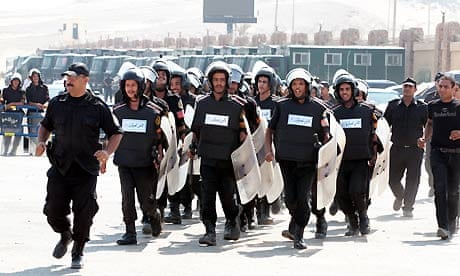Egyptian authorities have detained a further 92 people and vowed to use live ammunition to protect key buildings following the storming of the Israeli embassy last week, which left three protesters dead and provoked the worst crisis in Israel-Egypt relations for a generation.
"We won't allow anyone to attack the interior ministry or any police station," the interior minister, Mansour al-Essawy, told state TV. "According to the law, we will resist … If there is a danger to a building or those present inside the building, we will confront with bullets."
The latest crackdown brings the total number of arrests from Friday's protests to 130, and comes as Turkey's prime minister prepares to fly into the Egyptian capital on Monday night, to begin a four-day tour of north Africa.
Recep Tayyip Erdogan, who is embroiled in his own diplomatic row with Israel over the killing of pro-Palestinian Turkish activists by Israeli soldiers on the Gaza-bound Mavi Marmara aid flotilla ship last year, will address the Arab League on Tuesday. He is expected to outline Turkey's new "regional foreign policy vision", promoting closer ties with revolutionary Arab countries and sidelining their one-time ally Israel.
The trip will involve high-level talks with the de facto Egyptian leader, Field Marshal Mohamed Hussein Tantawi, and the interim prime minister, Essam Sharaf, with discussions focused on the forthcoming Palestinian bid for statehood at the UN, which both countries support, and the development of closer business links between the two nations. Turkey's trade with the Arab world has increased six-fold under Erdogan's rule – an indication of the country's shifting diplomatic and economic priorities in the Middle East.
Erdogan's rhetoric is likely to resonate strongly in post-Mubarak Egypt, where anger has been mounting in recent weeks over Israel's blockade of Gaza and a recent border incident that left six Egyptian soldiers dead at the hands of Israeli military forces.
The latest developments have left Egypt's military junta in a tricky position, as it seeks to appease public anger while reassuring foreign allies that it will carry on meeting its international obligations under the Camp David peace treaty with Israel.
Friday's clashes in and around the Israeli embassy come at a critical time for Egypt, as the trial of the former president Hosni Mubarak gathers pace and preparations continue for the country's first democratic elections in November. On Sunday, Tantawi rejected a summons to give evidence at Mubarak's court case, claiming he was too busy dealing with the ongoing security situation in the capital.
Tantawi is now scheduled to attend the trial in late September, along with several other key witnesses including Mubarak's former spy chief and vice-president, Omar Suleiman, the army's chief of staff, Sami Anan, and the current and former interior ministers. The judge has declared that testimony will be given in private, with television cameras barred from the courtroom.
Meanwhile, the separate trial of 25 former regime stalwarts on the charge of organising February's "battle of the camel" assault on Tahrir Square has begun. The incident on 2 February, which took place at the height of the anti-Mubarak uprising and provided some of the revolution's most memorable images, saw pro-Mubarak thugs on horses and camels armed with rods and maces charging protesters, and capped one of the bloodiest days of this year's dramatic political upheaval.
An official report into the attack accused Safwat el-Sherif, a senior figure in Mubarak's ruling NDP party, of organising the assault. Sherif and his fellow defendants have denied all the charges against them.
